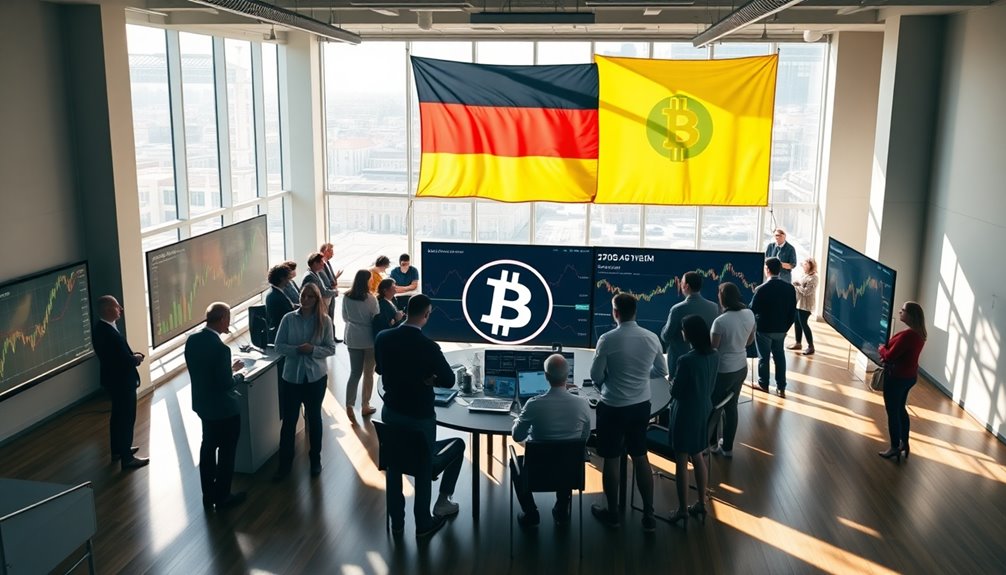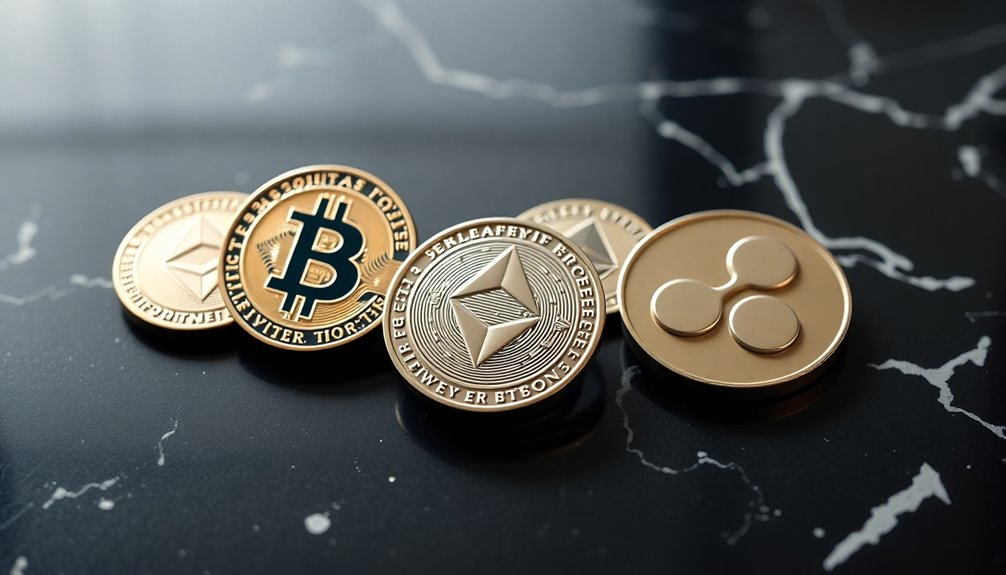Germany's strong Bitcoin adoption positions it as a potential leader in setting global digital asset standards. With over 4 million Bitcoin owners and more than half of investors holding significant portions of their portfolios in crypto, the market's enthusiasm is clear. The upcoming MiCA regulations will enhance investor protections and create uniformity across the EU. By embracing blockchain technology and innovative financial instruments like Bitcoin ETFs, Germany is paving the way for broader acceptance and compliance in the digital asset sphere. Keep exploring, and you'll discover what other developments might influence the global cryptocurrency landscape.
Key Takeaways
- Germany's regulatory framework, particularly the upcoming MiCA rules, aims to enhance investor protections and establish a clear digital asset market structure.
- The significant ownership of Bitcoin among Germans indicates strong market adoption, which could influence global digital asset investment trends.
- The issuance of blockchain-based government bonds demonstrates innovative financial strategies that could serve as a model for other nations.
- Germany's advanced technological infrastructure and institutional interest, including potential Bitcoin ETFs, may lead to standardized global practices in digital asset investing.
- Public education and awareness initiatives in Germany could address barriers to adoption, setting a precedent for effective integration of Bitcoin worldwide.
Current Crypto Landscape in Germany

As the crypto landscape in Germany evolves, you'll find that 9% of the population now owns cryptocurrencies, with Bitcoin and Ethereum leading the charge.
More than half of these investors have committed over 20% of their assets to digital currencies, showcasing a growing confidence in the market. This upward trend hints at a possible bull run as investor sentiment has improved significantly over the past year. In fact, over 4 million Germans own Bitcoin, reflecting the country's strong adoption rate. The average time to mine 1 Bitcoin is approximately 10 minutes per block, which highlights the ongoing activity in the crypto mining sector.
Germany ranks second globally for the number of cryptocurrency nodes, trailing only the USA.
With cryptocurrency trading accessible through popular exchanges like Bitpanda, Binance, and eToro, more people are embracing digital assets.
As market volume is expected to shoot up, Germany is solidifying its position as a key player in the European crypto scene.
Regulatory Environment and Compliance

While navigating the evolving landscape of cryptocurrency in Germany, it's crucial to understand the regulatory environment that governs this space.
Cryptocurrencies are classified as financial instruments, requiring exchanges to obtain licenses from BaFin. With the upcoming Markets in Crypto Assets (MiCA) framework, set to take effect in summer 2024, you'll see enhanced investor protections and standardized rules for exchanges and custodial wallets. This proactive regulatory approach promotes market integrity, ensuring a secure environment for both investors and service providers. Additionally, the approach parallels the regulatory oversight seen in sectors such as Gold IRAs, which also requires compliance with strict guidelines.
Compliance with Anti-Money Laundering (AML) and Know Your Customer (KYC) regulations is mandatory, ensuring exchanges monitor transactions and report suspicious activities.
Additionally, cryptocurrency is subject to capital gains tax and must be declared in annual tax filings.
Understanding these regulations will help you navigate your crypto investments more effectively in Germany.
Barriers to Widespread Adoption

Germany's regulatory framework lays the groundwork for cryptocurrency, but several barriers still hinder Bitcoin's widespread adoption.
Scalability issues in blockchain technology can lead to congestion and high fees, while security concerns about hacking may discourage new users. Furthermore, Germany's recognition of Bitcoin as a legal form of payment has sparked interest in addressing these regulatory complexities. To facilitate this process, a robust understanding of Gold IRA tax implications may help investors navigate the financial landscape more effectively.
You might also notice the challenge of interoperability between various blockchain systems and traditional finance.
Public awareness is crucial; without education on Bitcoin, many potential adopters remain hesitant.
Additionally, economic factors like price volatility and liquidity issues create financial risks that deter investment.
Politically, the lack of proactive policies and central debate on crypto can delay progress, while social barriers, such as public trust and cultural acceptance, must be addressed for broader adoption.
Institutional Innovations and Initiatives

With a rapidly evolving landscape, institutional innovations and initiatives are paving the way for Bitcoin adoption in Germany. One key development is the issuance of blockchain-based government bonds, enhancing market transparency and attracting new investors. This positions Germany at the forefront of blockchain financial technology, aligning with EU regulations like MiCA. Additionally, discussions about using Bitcoin as a strategic reserve currency aim to diversify Germany's gold reserves, modernizing its financial strategy. The potential launch of Bitcoin ETFs in the EU could provide regulated investment avenues, signaling growing institutional interest. All these efforts require significant technological infrastructure and compliance with existing frameworks, but they promise to create a more robust financial ecosystem for Bitcoin in Germany. Furthermore, the recent auction of 50,000 BTC has highlighted the impact of government actions on Bitcoin's market dynamics.
Future Strategies for Bitcoin Integration

Building on recent institutional innovations, future strategies for Bitcoin integration in Germany focus on creating a robust framework that balances regulatory clarity with technological advancements. You'll see the government considering blockchain for bond issuance, enhancing transparency and efficiency. Clear regulations will protect investors while fostering innovation, paving the way for Bitcoin ETFs that offer regulated options for all. As regulatory landscapes evolve, Germany can lead the way in establishing comprehensive guidelines that support both innovation and security. Expect advanced custody solutions and smart contracts to boost security and self-sovereignty. Additionally, implementing risk management strategies will help mitigate volatility and protect investors' interests. As Bitcoin becomes a strategic reserve asset, it aligns with economic trends and promotes financial inclusion. Moreover, by facilitating seamless cross-border transactions and emphasizing public education, Germany's approach could set global standards, influencing other nations and driving Bitcoin adoption forward.
Frequently Asked Questions
How Does Bitcoin Ownership Vary by Demographics in Germany?
In Germany, Bitcoin ownership varies significantly by demographics.
If you're a Millennial or Gen Z, you're more likely to own Bitcoin, as these age groups represent half of all crypto owners.
Men dominate the market, but interest among women is rising, narrowing the gap.
Younger investors often focus on long-term strategies and seek to diversify their savings, while older demographics might be more cautious about entering the crypto space.
What Are the Main Exchanges for Trading Bitcoin in Germany?
If you're looking to trade Bitcoin in Germany, you've got several solid options.
Bitpanda and Binance are popular for their user-friendly interfaces and low fees. Coinbase is expanding in Europe, making it a great choice too.
For those who prioritize regulation, Kraken and eToro comply with strict German laws. You might also consider Bitcoin.de, which caters specifically to local customers.
Each platform offers unique features, so pick one that suits your needs best!
How Does Germany's Bitcoin Approach Compare to Other Countries?
Germany's approach to Bitcoin stands out for its strict regulatory framework and classification of cryptocurrencies as financial instruments.
While many countries are still figuring out how to regulate crypto, Germany has established clear KYC and AML requirements.
You'll notice that Germany's banks can hold and sell cryptocurrencies, unlike in some nations.
This proactive stance not only enhances transparency but also positions Germany as a leader in integrating Bitcoin into the financial system.
What Role Do German Startups Play in Bitcoin Adoption?
German startups play a crucial role in Bitcoin adoption by driving innovation and expanding applications of blockchain technology.
You'll find many of these companies focused on financial services, enhancing efficiency and transparency in transactions.
The vibrant startup scene in cities like Berlin fosters collaboration and growth, while institutions increasingly embrace Bitcoin.
As regulatory frameworks evolve, these startups are positioned to lead the charge in making cryptocurrency more accessible and mainstream in Germany.
Are There Any Educational Resources for Learning About Bitcoin in Germany?
Yes, there are plenty of educational resources for learning about Bitcoin in Germany.
You can enroll in the Blockchain Certification Training in Hamburg or take the Bitcoin and Cryptocurrency course offered by The Knowledge Academy.
If you prefer a structured program, Berlin School of Business and Innovation has a four-week course.
For free options, check out the Bitcoin SV Academy's certified courses available online.
These resources cater to various learning preferences and skill levels.
Conclusion
Germany's approach to Bitcoin adoption could pave the way for global digital asset standards. By navigating regulatory challenges and fostering institutional innovations, you're witnessing a shift that could inspire other nations. While barriers remain, the commitment to compliance and strategic integration signals a promising future. As you keep an eye on Germany's developments, remember that their journey might just set the tone for how the world embraces digital currencies moving forward.









